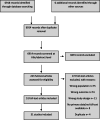Annual Research Review: The impact of Covid-19 on psychopathology in children and young people worldwide: systematic review of studies with pre- and within-pandemic data
- PMID: 36421049
- PMCID: PMC10952503
- DOI: 10.1111/jcpp.13716
Annual Research Review: The impact of Covid-19 on psychopathology in children and young people worldwide: systematic review of studies with pre- and within-pandemic data
Abstract
Background: The high volume and pace of research has posed challenges to researchers, policymakers and practitioners wanting to understand the overall impact of the pandemic on children and young people's mental health. We aimed to search for and review the evidence from epidemiological studies to answer the question: how has mental health changed in the general population of children and young people?
Methods: Four databases (Medline, CINAHL, EMBASE and PsychINFO) were searched in October 2021, with searches updated in February 2022. We aimed to identify studies of children or adolescents with a mean age of 18 years or younger at baseline, that reported change on a validated mental health measure from prepandemic to during the pandemic. Abstracts and full texts were double-screened against inclusion criteria and quality assessed using a risk of bias tool. Studies were narratively synthesised, and meta-analyses were performed where studies were sufficiently similar.
Results: 6917 records were identified, and 51 studies included in the review. Only four studies had a rating of high quality. Studies were highly diverse in terms of design, setting, timing in relation to the pandemic, population, length of follow-up and choice of measure. Methodological heterogeneity limited the potential to conduct meta-analyses across studies. Whilst the evidence suggested a slight deterioration on some measures, overall, the findings were mixed, with no clear pattern emerging.
Conclusions: Our findings highlight the need for a more harmonised approach to research in this field. Despite the sometimes-inconsistent results of our included studies, the evidence supports existing concerns about the impact of Covid-19 on children's mental health and on services for this group, given that even small changes can have a significant impact on provision at population level. Children and young people must be prioritised in pandemic recovery, and explicitly considered in planning for any future pandemic response.
Keywords: Covid-19; children; mental health; pandemic; young people.
© 2022 The Authors. Journal of Child Psychology and Psychiatry published by John Wiley & Sons Ltd on behalf of Association for Child and Adolescent Mental Health.
Figures













Comment in
-
Commentary: The impact of Covid-19 on psychopathology in children and young people worldwide - reflections on Newlove-Delgado et al. (2023).J Child Psychol Psychiatry. 2023 Apr;64(4):641-644. doi: 10.1111/jcpp.13765. Epub 2023 Feb 14. J Child Psychol Psychiatry. 2023. PMID: 36786395
References
-
- Angold, A. , Costello, E.J. , Messer, S.C. , & Pickles, A. (1995). Development of a short questionnaire for use in epidemiological studies of depression in children and adolescents. International Journal of Methods in Psychiatric Research, 5, 237–249.
-
- Barendse, M.E.A. , Flannery, J. , Cavanagh, C. , Aristizabal, M. , Becker, S.P. , Berger, E. , … & Pfeifer, J.H. (2022). Longitudinal change in adolescent depression and anxiety symptoms from before to during the COVID‐19 pandemic. Journal of Research on Adolescence. 10.1111/jora.12781 - DOI - PMC - PubMed
List of included studies
-
- Browne, D.T. , Wade, M. , May, S.S. , Maguire, N. , Wise, D. , Estey, K. , & Frampton, P. (2021). Children's mental health problems during the initial emergence of COVID‐19. Canadian Psychology, 62(1), 65–72.
Publication types
MeSH terms
Grants and funding
LinkOut - more resources
Full Text Sources
Medical

